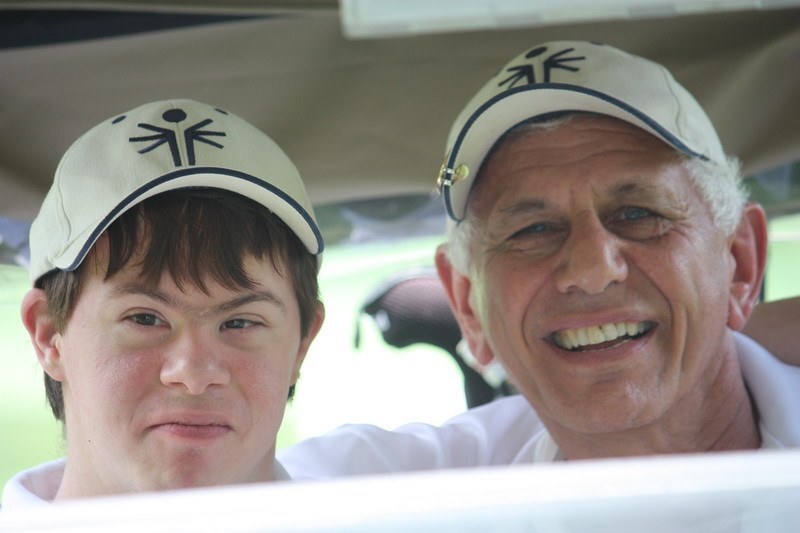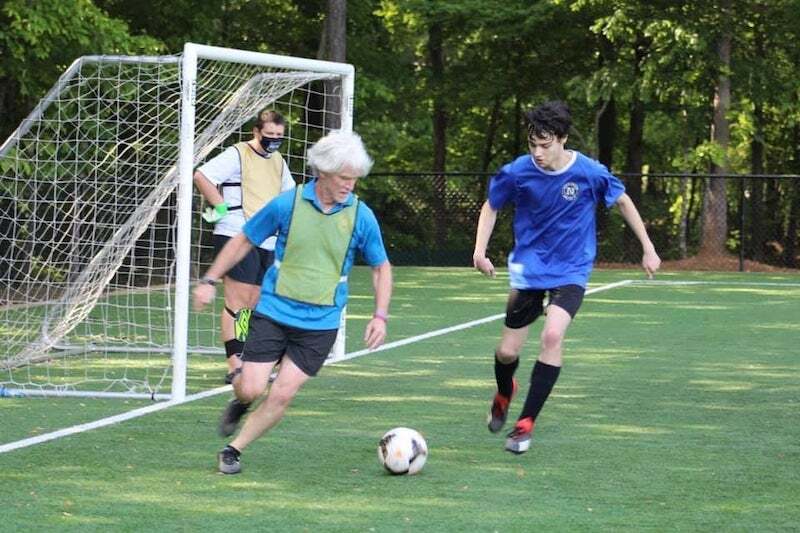For coaches nationwide, teaching and helping develop athletes is what drives them to continue making an impact. But for that dedicated group of coaches taking on Special Olympics, it’s much more than just watching athletic success. There’s a shared common bond with the passion it takes to impact the lives of athletes outside of sports, too.
For Joe Amadeo, coaching is much more than just training hard and supporting each other. It's helping teach life lessons outside of the competition. Over two decades, Amadeo has coached basketball, bowling, athletics, bocce, and floor hockey for Special Olympics New York, and he never forgets that there is much more to sports than just winning.

He has served as head coach and is the sports director for both basketball and floor hockey, as well as the basketball clinician.
"Joe Amadeo is the epitome of what Special Olympics coaches should be," Stacey Hengsterman, President and CEO of Special Olympics New York, says about Amadeo’s character. "His love of sports and continued passion for the game, our athletes and organization is unsurpassed."
His commitment to the athletes has been showcased in a variety of ways, but most importantly throughout the global pandemic. As in-person activities quickly came to a halt, Amadeo sprang into action. "During the pandemic, he was one of the first coaches to start virtual practices, despite not being the most comfortable with technology," reads his nomination form. He continued to "keep his team connected and informed" as "nothing was going to keep him away, not even the worst pandemic in history," it continues.
"The character and integrity of Coach Joe is the gold standard," a parent of a multi-sport athlete says.
Several hundred miles away, Beckie Headrick of Special Olympics Illinois tries to implement the same level of energy as Amadeo. A multi-sport coach, her philosophy is "to offer all her athletes the opportunities to be taught the techniques they need to be successful and reach their full potential as athletes."
Throughout the Special Olympics North America Region, no two athletes are the same. Each Program is faced with unique challenges. And Headrick faces them head-on.
One of her athletes uses a wheelchair and it makes Headrick think outside the box and create training exercises. "Beckie is always looking for various ways to train her and introduce her to other events," the nomination form says. She also reached out to the University of Illinois wheelchair sports for their input and support.
"As her time with SOILL has gone on, so has her leadership; both with her agency and the entire region," Dave Breen, President and CEO of Special Olympics Illinois, says. "Due to COVID-19, this year has been exceptionally challenging and isolating for this town. Beckie has gone above and beyond to ensure her athletes are not feeling isolated as they have been more active than ever."
Being very involved with the school teams, Headrick recognizes how important it is for all individuals to learn important life lessons, even if they approach those lessons in different ways. Her natural attention to detail allows Headrick to ensure each athlete learns from her, both on and off the field of play. Karen Jimenez, a parent of two Special Olympics athletes says, "her willingness to learn new sports and skills and then teach the athletes to see them (through) to completion has repeatedly impressed me over the years."
Just in the past year, Headrick has added three new sports for athletes to train and compete in, and she has her athletes participate in every virtual activity that is offered.
"Beckie's passion and energy for the mission of Special Olympics have no limits," Breen says.
In Connecticut, John Dubinsky has shown the same passion and energy for more than 25 years. Having several certifications through the YMCA, he is one of the most knowledgeable people involved with the organization and shares his swimming knowledge with each athlete he coaches. He truly believes that "all athletes are winners" and is always "working to improve weaknesses and strengthening their strengths."
When Dubinsky had an athlete who struggled with the 100m race, she asked to drop divisions to the 50m race. Instead of agreeing and allowing her to give in, Dubinsky encouraged her to keep trying.
She was successful but it was the "joy in being able to accomplish her goal with the help and encouragement from her coach" that meant the most.
He is empowering, compassionate and patient. And that goes a long way.
"Coach is always there for us and is always very kind and happy and he makes me feel really good about myself," Special Olympics Connecticut athlete Will Geanuracos says. "I think he's the best coach ever and made me love swimming."
While all coaches go above and beyond for their athletes, sometimes it's not just about the coaching.

Having been a coach for six years, Marty Jelleme’s big focus for Special Olympics Georgia athletes is teamwork, friendships, fundamentals and just having fun. "Coach Marty is special to us. He is a leader and gives us a chance to make friends and play sports," Kelly Robinson, a Special Olympics athlete, says about what Jelleme means to her.
"Marty's passion for Special Olympics has a true impact on the athletes in Georgia and he continues to shine with his time and dedication to all players, athletes, partners, coaches, and other volunteers," Georgia Milton-Sheats, CEO of Special Olympics Georgia, says. Jelleme is also the founder of the North Fulton United, a Unified soccer league with just about 100 athletes and Unified partners.
By day, a PGA professional and general manager at Sahalee Country Club, Marcus King still holds weekly golf practice for his Special Olympics Washington athletes.
A long-standing staple in the area, his nomination form reads, "more than any of his accomplishments, Marcus continues to lead and coach our state with a passion that is unrivaled and is long overdue for an honor of this magnitude."
"He has given me confidence with my golf game and to speak my mind, thus becoming a public speaker in support of Special Olympics," says Tyler May, a Special Olympics athlete.
Like King, Mary MacLeod has a busy schedule. A multi-sport coach for Special Olympics Colorado, she can be found at a variety of locations depending on the time of year. "During the winter season, she is found at the skating rink one day (for speed skating practice) and then bundled up, even more, to take her snowshoe team to the mountain trails to train," the nomination form reads.
When the global pandemic hit and state restrictions were put in place, "her first concern was to make sure we could safely have our bocce practices without putting athletes or coaches at risk. Following the guidelines, Mary put a plan together and with the coaches and athletes working together we had two great bocce sessions."
For Special Olympics Colorado President and CEO Megan Scremin, MacLeod’s willingness to go out of her way to make sure everyone was okay during a challenging year for many sticks out the most.
"Mary didn’t give up on providing her athletes with the essential health and life benefits of Special Olympics competition," Scremin says. "Once practices were safe to resume, Mary took health precautions seriously, working hard to keep the vulnerable athletes and coaches on her teams healthy."

Georgia McClaskey is a special education teacher and works closely with Special Olympics Washington athletes on the high school's Unified Sports teams. Having coached basketball and track and field for four years, McClaskey has several certifications including the WIAA general rules clinic and the WIAA approved rules clinic for bowing, basketball and track and field. In addition, she attends all Unified coaching trainings and is first aid certified and has a valid CPR certification.
"Having been a Special Olympics coach myself for over 40 years, I recognize in Georgia all the traits and dedication that great coaches bring to our athletes and our organization," Dave Lenox, former Special Olympics Washington President and CEO, says. "Her sense of humor and genuine joy in seeing her athletes and partners grow and succeed is contagious."
Since 2007, Rhoda Powell has coached her teams a minimum of two times a week. As a dedicated member of Special Olympics Montana, Powell takes advantage of any training opportunity that is offered.
"She is one of the only coaches who has continued to attend training during the COVID-19 pandemic. She strives to be ‘in the know’ on the most recent rules and adjustments in each sport, regardless of the sports season," reads her nomination form.
With a very hands-on coaching style, "she expects hard work and commitment to their sport (by athletes)," the nomination form says. "She also wants the athletes to have fun and enjoy competitions. At practice, it is obvious she has taken the time to get to know each athlete and how to help each one individually."

Nancy Schmidt has coached several sports for eight years with Special Olympics Maryland. A coach with a soft touch, she believes each athlete should compete to his/her ability level. And she's found success with that.
In 2014 she accompanied her softball team to the 2014 Special Olympics USA Games and attended the 2018 USA Games in Seattle as a basketball coach.
"It has been my pleasure to have known and worked with Coach Schmidt since my coming to SOMD as president and CEO in 2013," Jim Schmutz says. “Her supportive yet demanding ways with her athletes consistently yields athletes and teams that play to the maximum of their ability and work as a cohesive unit. Athletes learn to make decisions on the field of play on their own rather than looking to the coach for what to do in particular situations.”
Wherever the coaches are from, being nominated as a Special Olympics North America Outstanding Coach is a high honor that is not to be overlooked. Their dedication and commitment can be compared to coaches outside of Special Olympics, but it's the extra work they do to make each athlete feel included that sets them apart.










